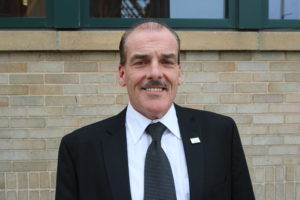“I was tired of not knowing what HUM was about”
Allen, age 53, was born and raised in Baltimore, Maryland. “I grew up in East Baltimore, but at the age of 14, I was moved to one of the worst neighborhoods in West Baltimore and placed in foster care,” recalls Allen. “I understood what the “system” was trying to do. The move seemed great at the time. There were porch front homes. Kids had mothers and fathers. It was a healthier family setting. But, outside of those homes, the neighborhood had a “gang bang” type of mentality.”
“From age 12 to 16, I was just smoking marijuana. But, when I moved to East Baltimore, I started seeing guys shooting up heroin. The same guys were like ‘bosses’ of the neighborhood and you did not mess with them. I hung out with a gang of guys, and we made a pact. As long as we did not buy drugs to use, using was okay, because we equated addiction with guys that spent money on drugs. So, we took what we needed. Eventually, some guys figured out what we were doing. They said, ‘we know what you are doing. We think that you are a cool dude but keep taking from us and there will be consequences.’ I ended up forging friendships with a lot of them.”
“I began to navigate through my drug usage, through my addiction. Using was like a circuit, just repeating the cycle. Man, I was on that cycle until I was 46 years old! I always had a way out. I went through a lot of abuse as a child. I was ‘damaged goods.’ But I began to doubt my life. I love change and I started to wonder what it would take for me to change the way I was living. What would it take for me to find a way out of this wheel? I clearly said I need to find a way out!”
“The first time that I came to Helping Up Mission (HUM) in 2014, I got turned down at the door. One day, I decided that I was tired of not knowing what HUM was about. I entered the building and started looking around and ran into Kevin Healey, Director of Program Accountability. Kevin said, ‘I know you from somewhere!’ I told him that I had not been allowed into the program so many times that he recognized me from not letting me in. Without delay Kevin asked if I was ready. I did not intend to enter the program that day. But I felt that it was meant for me to be there.”
“I came in December 2014 and graduated Christmas Day 2015. I remember my first Christmas here. I was in Overnight Guest Services (OGS), and I had feelings about not having a home to go to for the holidays. But, this volunteer, a little girl, asked if I could use a. She was an angel and I still have it.”
“In 2016, I got into a relationship, and even though I was not ready to leave due to unfinished business, I left HUM. I had a job, a relationship, and a nice house with a peaceful front porch. Everything was so quiet. I felt like I was on probation, and I relapsed. I remember thinking of what might happen, what I would have to go through, and I decided to seek my recovery. I reentered HUM through the Johns Hopkins 9-1-1 program, but I did not surrender. I was trying to chase my old recovery.”
“One day, Pastor Gary Byers saw me and said,’ I knew that you would be back. Allen, you needed to be sold on the real joy of recovery.’ He nailed it! I surrendered, and today I love learning about myself. Pushing myself beyond what is dangerous or comfortable and being honest makes me free. Freedom today means not being prisoner to my old thinking, feelings, and emotions.”
“HUM has given me determination, better mental health, and better mental awareness. I earned certifications in computer fundamentals, Microsoft Word, and Excel. I have addressed my child support. I have also received my certification to become a Peer Recovery Support Specialist.”
“It has become obvious to me that there is a Higher Power. I have been in enough situations where it was not me, but Him who got me through it. When I first came back to HUM, I worked in housekeeping, but I felt like I wanted to do something more. I felt Him say ‘please be still. What I have for you will be for you.’ Shortly after I was asked to work with the Treatment Coordinator (TC) team. I get to help men in the program navigate and communicate with their TC’s. I had a lot of apprehension during my recovery, so I can help the guys coming in.”
“I have four kids and my relationship with them is wonderful. I came from a broken home, and it is important for me to help my kids break the chain of not having their fathers in the family. We are going to get through this together. “
“Thanks to the donors for their compassion. The guys around here are living, walking miracles. You are changing the world. I never thought that I could lead a happy life. At my age, when you come into recovery, you are masked up and uncomfortable. At HUM you can experience freedom and real Spiritual Recovery. Thank you!
